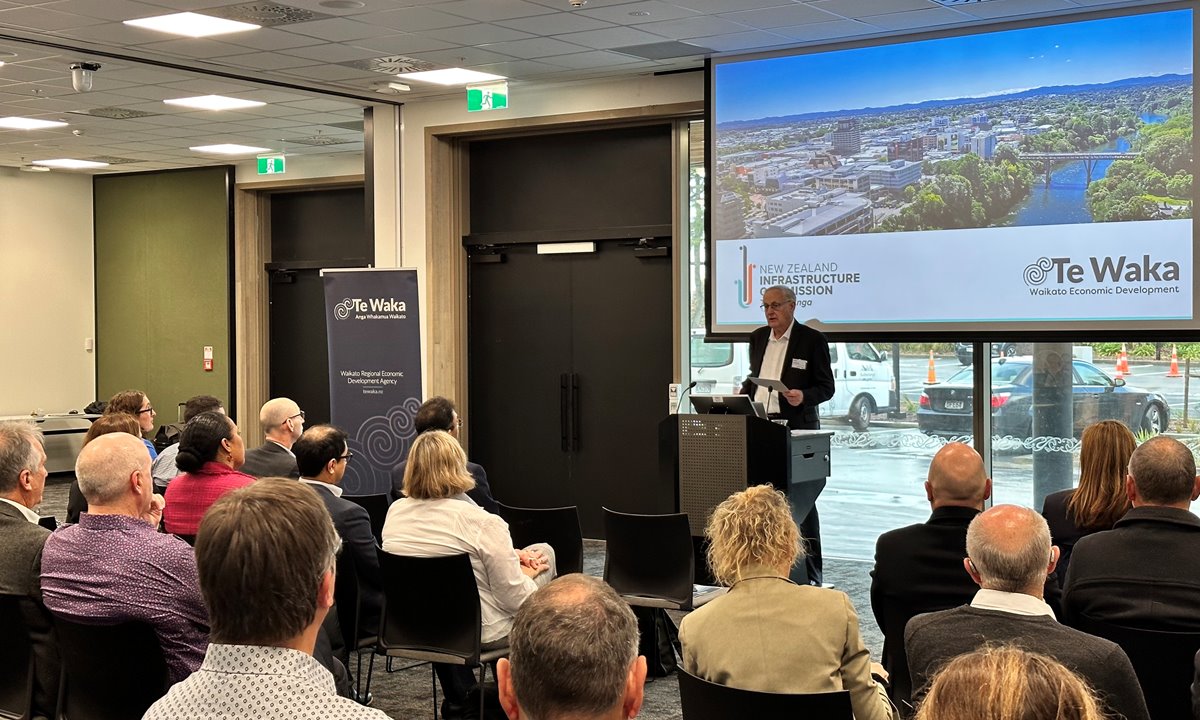Te Waka recently hosted the Infrastructure Commission to discuss how the Waikato, and Aotearoa at large, can rise to the regional growth challenge.
The Waikato is growing. Opportunities are knocking at our door and we need to position ourselves to capitalise on these when they appear.
For General Manager Economic Development Rosie Spragg, the visit from the Infrastructure Commission reinforced the fact that we are at a crucial turning point for the future of our region and its ongoing growth.
The Waikato is in growth mode: both opportunities and constraints are making themselves known.
Historically, Aotearoa has tended towards a ‘just-in-time’ approach to infrastructure development. This short-term thinking, while fixing the immediate problem, raises more issues down the track that can become increasingly costly to address. This can lead to situations where processes like land designations are left far too late, and land is too expensive when you realise that you need it.
In the Waikato we have an opportunity to reflect on what could be improved upon elsewhere and ensure we do things differently in our region. We want to prevent what we are already seeing in Auckland and Tauranga: population growth outstripping infrastructure growth.
An example of our thinking and action in this area is our work to lead the development and delivery of the Waikato & Bay of Plenty Freight Action Plan. This was the first report of its kind to bring together the perspectives of major freight and logistics industry players, looking at the actions needed to support the sector’s growth and progress.
Our plan highlighted the need for bi-partisan commitment from local and central government alike to programmes of infrastructure over much longer periods than our three-year political cycles. In delivering against the plan we have worked with industry to build a detailed understanding of long-term transport infrastructure needs in the region to improve efficiency, resiliency and safety outcomes.
The planning and funding of new infrastructure investments needs to be considered on horizons far greater than three years ahead. For the Waikato to become a serious contender for groundbreaking infrastructure, we need funding models to support opportunities when they arise, founded on long-term scenario planning that creates optionality.
We are also currently partnered with BlueFloat Energy in support of its plan to bring a multi-billion-dollar offshore wind project to the coast off Raglan: an infrastructure project that could revolutionise renewable energy generation in Aotearoa. Our infrastructure funding models need to reflect the fact that we are well positioned for new infrastructure projects like this one. We can see the growth that is possible. A global energy firm like BlueFloat can see the growth that is possible. Now, our region needs a mandate to match.
We need solutions, with focus on long-term planning, centralised funding, and regional partnerships.
The Infrastructure Commission session made it clear that we need solutions that focus on long-term planning and centralised funding. We need to be more optionality focussed in our thinking, considering what could be possible in future rather than what is achievable currently.
An option that stands out as worth considering is the creation of regional deals, which shift the mandate for control of infrastructure projects from the centre to the region. This allows those with on-the-ground knowledge to make the decisions on infrastructure in their own backyard. To us, this stands out as a worthy framework for bringing together national level funding and objectives with local level insights and priorities.
This framework isn’t without its challenges: while there is value in prioritising a regional perspective, ensuring all regions are progressing as best they can alongside one another is also key, and a role which a central organisation could take on.
Matching infrastructure to growth is a challenge, and we’re well-placed to rise to it.
At Te Waka, we take a region-wide view of our current infrastructure climate and how it compares to what the Waikato needs to reach its potential. We have strong economic foundations, and we need to ensure ours is a region future generations will thrive in.
This past month we’ve witnessed one of the greatest sporting spectacles in history, and one our region proudly played a significant part in. The FIFA World Cup has shown us what adequate investment, support and planning can achieve.
Maintaining our position as a region worthy of showcasing on the world stage will come from taking the time now to consider the likely long-term scenarios for the Waikato that need to inform our planning, before our growth outstrips the infrastructure we have.



.jpg?sfvrsn=14164ce5_1&mode=crop&width=770&height=462&format=jpeg&quality=85)
.jpg?sfvrsn=414c0434_1&mode=crop&width=770&height=462&format=jpeg&quality=85)
.png?sfvrsn=16db4cf2_1&mode=crop&width=770&height=462&format=jpeg&quality=85)